Palace Hotel Co., Ltd. is committed to continuing its legacy of making guest safety its utmost priority at all times and positively impacting the environment and the community in which it operates.
At the core is the spirit of Omotenashi (Japanese hospitality), where bringing joy to people is what brings us joy.
We promise to contribute to the achievement of a sustainable society by extending Omotenashi to the future world, in the same way we extend Omotenashi to our guests.
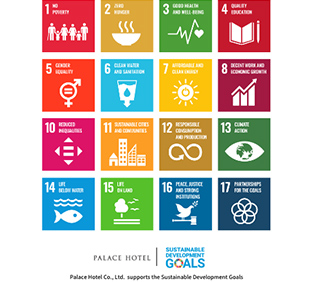
SUSTAINABILITY CONCEPTOmotenashi For The Future
THREE PILLARS OF ACTIONOmotenashi in Service to People
Omotenashi in Connection with Society
Omotenashi in Harmony with Nature
-
Disaster Prevention
・1985 - | Formation of the in-house fire prevention team, which participates annually in the community competitions held by the Marunouchi Fire Department with both the men’s and women’s team winning prizes regularly.
・2012 - | Palace Hotel Tokyo was rebuilt to incorporate some of the most sophisticated vibration control technology. Its fire prevention standards are certified by the Tokyo Fire Department and extensive drills are conducted on a regular basis and supported by a comprehensive internal manual on emergency management as well as detailed in-room instructions on emergency procedures.
・2021 - | To be prepared for major floods, watertight door has been installed in the underground passageway and drills to open and close the door are conducted on a regular basis.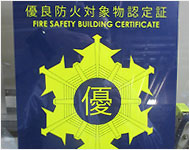
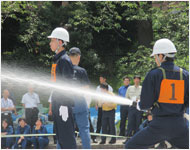
-
Food Safety
・Every kitchen in Palace Hotel Tokyo is designed for optimum safety and efficiency in the handling and preparation of food.
・Extensive in-house training on safe food handling, hygiene and incident prevention is conducted on a regular basis to ensure industry best practices are consistently met.
・A menu management committee meticulously reviews the contents of each menu to ensure accuracy in the description of ingredients and food presentations.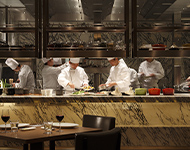
-
Motivating Employees
・Palace Hotel Tokyo welcomes qualified students from hotel and culinary schools to give them the opportunity to gain valuable work experience outside of the classroom while still in school, under the tutelage of highly experienced hospitality professionals.
・We promote the employment and empowerment of foreign citizens and persons with disabilities as well as support childcare for employees, to achieve diversity and inclusion.
・Employees with exceptional performances that exceed our guests’ expectations are awarded on a regular basis.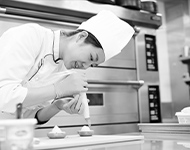
-
Reconstruction Support and Donation Activities
・2014 - | Palace Hotel Tokyo has been participating in the Ecocap Movement which promotes recycling and reduces CO2 emission and provides medical support for developing countries by the profits and supports employment of persons with disabilities and elderly people in the process.
・2017 | Donated the hotel’s disaster supply stock of drinking water upon replacement.
・2020 - | Regular donation to food banks of pieces of baked goods not suitable for selling, which are then distributed to nursing homes and Children’s Cafeterias for those in need.
・2021 | Donated a portion of the proceeds of the hotel’s original eco-friendly reusable bag to a nature conservation organization.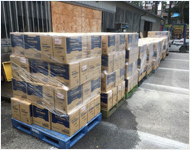
-
Reducing Food Waste and Loss of Resources
・1995 | Succeeds in developing a system for converting chicken carcass that were used to make chicken stock into powder form.
・1997 | The recycled kitchen refuse is made into a bio-degradable fertilizer “Eco-Palace” and distributed for utilization by some local farms, the produce being returning to the hotel for use creating a circulation recycling system.
・2021 - | Creation of new cakes utilizing the cut-off edges of cakes.
・2021 - | Creation of new menus in collaboration with FOOD LOSS BANK: Cake Salé utilizes imperfect vegetables removed from the supply chain due to their substandard shapes and sizes, and Strawberry Parfait Glacé utilize imperfect strawberries removed from the supply chain.
・2022 - | A new menu, Pain Perdu, was created from adding a small touch to pain de campagne made in large quantities in anticipation of refills for wedding reception guests but never had the chance to be served.
・2023 - | Creation of BAKERY BOX - sustainable - for our online shop, utilizing breads that were made in large quantities in anticipation of refills for guests but never had the chance to be served.
・2023 - | Creation of Rice Flour Cake in collaboration with FOOD LOSS BANK utilizing rice flour made from rice grown by sustainable farming methods, old rice, and imperfect rice removed from the supply chain.
-
Community Initiatives
・1992 - | Weekly clean-ups of the hotel premises.
・2003 - | Palace Hotel Tokyo has been a corporate sponsor of the complimentary Maruouchi Shuttle which services the areas of Otemachi, Marunouchi and Yurakucho - the OMY area - helping to promote the surrounding community to domestic and international visitors alike.
・2013 - | Participation in “OMY Kirapika Strategy,” a routine clean-up activity organized by the OMY Area Management Association.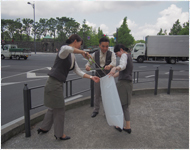

-
Sustaining Traditional Culture and Art
・2012 - | Tradition and contemporary coexist in the Marunouchi district where Palace Hotel Tokyo stands. Through both international and local artwork as well as interior decor incorporating traditional Japanese techniques, we present guests with the essence of the Japanese culture and the very best of Japan, serene and refined.
・2019 - | The launch of “The PALACE” magazine, introducing and disseminating traditional Japanese culture.
In addition, various artistic and cultural activities are hosted by Palace Hotel Tokyo, such as Japanese dance performances and flower arrangement exhibitions.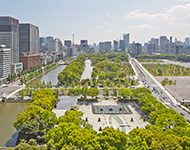
-
Reducing CO2 Emissions and Decarbonizing
・2012 - | As part of its complete reconstruction, sophisticated energy saving equipment has been installed throughout Palace Hotel Tokyo, including highly efficient air-conditioning systems, solar-powered generators, combined heat and electric power generators, total heat-exchangers for guestroom air-conditioners and rooftop greening.
・2012 - | High-tech air-flowing windows were also installed in the adjoining Palace Building, which reduces the impact from the outdoor air and keeps the load on the air-conditioning system to a minimum.
・2015 - | A supercharger for Tesla electric cars is installed.
・2016 - | The light bulbs in the guestrooms are changed from krypton to LED, reducing approximately 240,000 kW annually (equivalent of approximately 109 tons of CO2).
・2020 - | Utilization of green energy.
・2024 - | Guestroom ceiling lights are changed to LED bulbs, reducing approximately 413,000 kW of energy annually (equivalent of approximately 188 tons of CO2).
・2024 - | Begins conversion of lights within the Palace Building to LED, scheduled to be completed by 2028.
-
Other Environmental Initiatives
・2019 | Starts the changes of materials of single-use plastic products such as straws and plastic cutlery.
・2020 - | Adoption of FSC-certified paper on the hotel brochures and paper bags, supporting responsible forest management and preserving the forest.
・2021 - | Using locally grown vegetables from farms within Tokyo, Palace Hotel Tokyo supports the preservation of farmlands or the metropolitan area while also reducing the environmental impact of long-distance transportation.
・2021 - | In an effort to reduce the environmental impact from our food, All-day Dining Grand Kitchen offers environmentally-friendly menus using meat subsitutes.
・2021 | Palace Hotel Tokyo acquired the Eco Mark certification “Hotels and Inns Version 2.0,” awarded to facilities engaged in environmental initiatives on a high level, such as reducing food loss, contributing to the community and society, in addition to other basic environmental measures.
・2022 - | In accordance with the Act on Promotion of Resource Circulation for Plastics which went into effect on April 1, Palace Hotel Tokyo and Zentis Osaka aim to reduce the usage of 12 specified plastic items by 60% by 2024, in comparison to 2019.
*This objective was achieved in 2023.
・2023 - | Waste oil from hotel restaurants is upcycled into Dish & Hand Soap which is 98.9% biodegradeble in 5 days.















